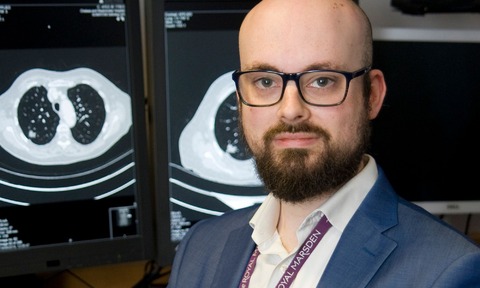Artificial intelligence could help doctors diagnose lung cancer earlier, concludes a study led by researchers from three top UK medical institutions.
The scientists from the Royal Marsden NHS Foundation Trust in collaboration with The Institute of Cancer Research, London, and Imperial College London were part of the LIBRA study supported by The Royal Marsden Cancer Charity, the National Institute for Health and Care Research (NIHR), RM Partners and Cancer Research UK.
Employing data from almost 500 patients with large lung nodules’ CT scans, they created an AI algorithm which was tested to see if it could accurately identify cancerous nodules.
Using the so-called AUC (area under the curve) measure to judge the model’s effectiveness, they assessed it achieved an AUC of 0.87: An AUC score of 0.5 corresponds to random guesswork, while a score of 1 indicates total accuracy.
Researchers hope the results published in the Lancet’s eBioMedicine suggest the technology could help fast-track high risk patients and streamlining scan analysis.
CT scan data was analysed using radiomics to extract information from medical images that can’t be accurately seen by eye.
Dr Benjamin Hunter (pictured), Clinical Oncology Registrar at The Royal Marsden NHS Foundation Trust and Clinical Research Fellow at Imperial College London, who is funded by Cancer Research UK, said:
“According to these initial results, our model appears to identify cancerous large lung nodules accurately. In the future, we hope it will improve early detection and potentially make cancer treatment more successful by highlighting high-risk patients and fast-tracking them to earlier intervention. Next, we plan to test the technology on patients with large lung nodules in clinic to see if it can accurately predict their risk of lung cancer.”
Lung cancer is the leading worldwide cause of cancer mortality, responsible for more than a fifth (21%) of UK cancer deaths. While early-stage disease can be treated more effectively, more than 60% of lung cancers in England are not diagnosed until either stage three or four.
Chief investigator for the LIBRA study, Dr Richard Lee, Consultant Physician in Respiratory Medicine and Early Diagnosis at The Royal Marsden NHS Foundation Trust and Team Leader for the Early Diagnosis and Detection team at The Institute of Cancer Research, London said:
“Through this work, we hope to push boundaries to speed up the detection of the disease using innovative technologies such as AI.
“People diagnosed with lung cancer at the earliest stage are much more likely to survive for five years, when compared with those whose cancer is caught late. This study – which is the first to develop a radiomics model specifically focused on large lung nodules – could one day support clinicians in identifying high-risk patients.”











